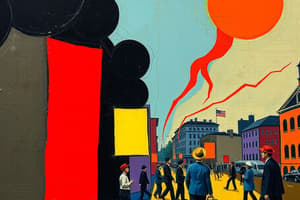Podcast
Questions and Answers
What was one main consequence of collectivization in the Soviet Union?
What was one main consequence of collectivization in the Soviet Union?
- Political reform
- Increased agricultural productivity
- Food shortages and starvation (correct)
- Economic stability
The New Deal completely fixed unemployment in the United States.
The New Deal completely fixed unemployment in the United States.
False (B)
What economic approach did Great Britain ignore during the Depression?
What economic approach did Great Britain ignore during the Depression?
Keynesian economics
Totalitarianism is a government where one leader controls everything in people's _____?
Totalitarianism is a government where one leader controls everything in people's _____?
Match the following terms with their definitions:
Match the following terms with their definitions:
What was a significant economic issue faced by Germany after World War I?
What was a significant economic issue faced by Germany after World War I?
The New Deal was initiated in the United States to address the economic challenges of the Great Depression.
The New Deal was initiated in the United States to address the economic challenges of the Great Depression.
What was one major outcome of the Great Depression in Germany?
What was one major outcome of the Great Depression in Germany?
Mussolini led the March on _____ to gain control of Italy.
Mussolini led the March on _____ to gain control of Italy.
Match the leader to their associated country and government type:
Match the leader to their associated country and government type:
Which economic strategy did Stalin employ to make the Soviet Union stronger?
Which economic strategy did Stalin employ to make the Soviet Union stronger?
The Gestapo was established in Germany to promote peace and stability.
The Gestapo was established in Germany to promote peace and stability.
What was one method used by Mussolini to promote Fascist ideals among young people?
What was one method used by Mussolini to promote Fascist ideals among young people?
Flashcards
Collectivization
Collectivization
Stalin's policy of taking privately owned farms and making the government control them.
Great Purge
Great Purge
Stalin's campaign of eliminating political opponents, even allies.
New Deal
New Deal
Roosevelt's programs to create jobs and help the US economy during the Depression.
Totalitarianism
Totalitarianism
Signup and view all the flashcards
The Great Depression
The Great Depression
Signup and view all the flashcards
German Hyperinflation
German Hyperinflation
Signup and view all the flashcards
Global Great Depression
Global Great Depression
Signup and view all the flashcards
Fascism
Fascism
Signup and view all the flashcards
Mussolini's Rise to Power
Mussolini's Rise to Power
Signup and view all the flashcards
Hitler's Nazi Regime
Hitler's Nazi Regime
Signup and view all the flashcards
Holocaust
Holocaust
Signup and view all the flashcards
Stalin's Five-Year Plans
Stalin's Five-Year Plans
Signup and view all the flashcards
Study Notes
Lesson 1: The Great Depression (Pages 749-753)
- Many European countries, especially Germany, faced huge economic struggles after World War I.
- German hyperinflation in 1923 significantly devalued German currency, making basic goods unaffordable.
- The global Great Depression (1929-1939) began with the U.S. stock market crash, causing job losses, poverty, and economic chaos worldwide.
- Countries imposed tariffs (taxes on imports) to shield their domestic businesses.
- Governments attempted to cut budgets, but this failed to revive the economies.
Lesson 2: The Rise of Dictatorships (Pages 754-760)
- Fascism is a political system where the government controls every aspect of life, prioritizing national strength through a powerful military.
- Mussolini, the Italian dictator, used promises of restoring Italy's glory, inspired by the Roman Empire, to gain power.
- In 1922, Mussolini led the "March on Rome," forcing the king to appoint him Prime Minister.
Lesson 3: Democratic Responses to the Depression (Pages 761-771)
- France faced economic instability due to a weak economy, causing political instability and slow recovery.
- Great Britain focused on traditional economic policies, adding import taxes and avoiding job-creating spending. They ignored Keynesian economics.
- The U.S. implemented Roosevelt's New Deal, creating jobs and programs like social security to address unemployment. The New Deal somewhat improved the situation but didn't eliminate unemployment completely.
Additional Information
- The Great Depression was a worldwide economic crisis in the 1930s, causing widespread poverty and unemployment.
- The New Deal refers to the economic programs implemented by U.S. President Franklin D. Roosevelt to address the Great Depression.
Studying That Suits You
Use AI to generate personalized quizzes and flashcards to suit your learning preferences.
Related Documents
Description
Explore the tumultuous events of the early 20th century, focusing on the economic crises following World War I and the rise of authoritarian regimes. This quiz covers key concepts like the Great Depression, hyperinflation in Germany, and the emergence of fascism under Mussolini. Test your knowledge of these critical historical developments!




